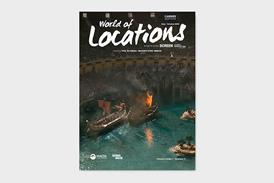
As securing distribution for arthouse films has become more challenging, festivals have come to play an ever more important role as a launch platform for filmmakers.
World, regional and national premieres at festivals are now a vital way to gain the attention and interest of cautious buyers, whose business model has been so disrupted by the streaming revolution and the pandemic.
But the growing number of film productions - 2,358 features were produced in Europe alone in 2023, according to the European Audiovisual Observatory - mean that competition for festival slots is becoming fiercer than ever.
The result: the role of a festival manager at sales companies has become increasingly significant.

Over the last 20 years, the festival manager role has professionalised. Previously it was often a job given to an intern - now every leading sales agency has a festival manager, notes Theo Lionel, who fills the role at The Party Film Sales, which had four films in Official Selection at Cannes this year. Having one person as a permanent point of contact with programmers is essential for building long-lasting relationships with festivals, he observes.
The job itself is all about curating an individual festival strategy for each film to maximise its possibilities of distribution around the world, in close co-operation with the filmmakers, producers and senior sales executives.

“The festivals are platforms not only for garnering the first audience reactions, but to give the spotlight that translates into international press reviews, attention from distributors and festival programmers from around the world, all of which are essential to pave the road for the film to travel widely and have a ‘long life’,” says Rūta Švedkauskaitė, festival manager at Films Boutique, which had Hasan Hadi’s The President’s Cake in Cannes’ Directors Fortnight.
Festival managers will also help a film to circulate in unsold territories, making sure that it can be seen through festival plays or at cultural institutions. For smaller films that might not achieve wide distribution, a festival run also be an important source of revenues with screening fees ranging from €200 to over €1,000.

“Festivals should always be considered for arthouse films,” says Cecilia Pezzini, festival manager at Coproduction Office, which had Sergei Loznitsa’s Two Prosecutors in Competition at Cannes this year. “A good premiere maximises visibility, adding value and appeal not only for distribution but also for further festival bookings. It creates buzz and momentum.”
Cannes, Venice and Berlin are regarded as ‘the big three’ by many filmmakers, and European producers, particularly French ones, are increasingly scheduling their production and post production to be ready for Cannes.
Sundance, Toronto, Locarno, San Sebastian, Rotterdam, Tribeca, Tallinn, Karlovy Vary and SXSW are also highly valued for world premieres. Many festival strategies will try to combine festivals: Sundance and Berlin or Toronto and San Sebastian are useful combinations. Festivals with strong markets – like Cannes’s Marche du Film and Berlin’s EFM – are sought after. For documentaries, IDFA and CPH:DOX are highly regarded, while Sitges and Fantastic Fest are important genre platforms.
A world premiere is never enough alone to secure widespread distribution. Subsequent regional premieres in North America, Asia and Latin America can help secure further sales.
The first year after the world premiere is decisive, says Lionel. “It’s when you can secure as many national premieres as possible to help with distribution in each territory.”
If filmmakers fail to secure a slot at one of the big three festivals, regional festivals can be helpful. Gothenburg, for example, is good for Scandinavian distribution, or Tallin for the Baltics and Karlovy Vary for Eastern Europe. For a large country like India, it might mean going to several festivals like IFFI Goa, MAMI Mumbai, Pune and Kolkata. For the Middle East, where distribution can be difficult for arthouse films, festivals like Red Sea, Cairo, El Gouna and Marrakech are key.
Festival managers say an effective festival run will normally include playing at a minimum of 40 different festivals worldwide, including national premieres and specialised festivals.
As for advice, they offer the follow tips.
- Make sure the right programmers watch your film – be proactive and follow up entries.
- Submit at the right time, the sooner the better as slots fill up. Berlin, for example, is already watching films for its next edition in February 2026. Sometimes it’s good to send a work-in-progress version.
- Build contacts with programmers – this is a relationship business. Talk to them about your film in the best possible way, get to know their tastes and make them curious.
- Having a sales agent on board helps. They have good contacts with selection committees.
- Have a clear idea about why your film is suitable for a festival.
Ultimately, though, it’s the quality of the film that leads to success, says Maria Lanfranchi, festival specialist at Rai Cinema International Distribution, which had Alessio Rigo de Righi and Matteo Zoppis’s Heads Or Tails? in Un Certain Regard this year. “I always believe in the films but some might work for one festival but not another.”

Not all films follow a conventional path. Take, for example, Mohammad Rasoulof’s The Seed of the Sacred Fig which played in competition at Cannes last year. Films Boutique could only show it to the selection committee very late as the film material had to be smuggled out of Iran. Neither could they talk about the project too much in advance to protect the director and the crew. The film went on to screen at close to 100 festivals including major sections like Locarno’s Piazza Grande, San Sebastian’s Perlak, TIFF’s Centrepiece, Busans’ Icons and IFFR’s Harbour as well as Telluride and New York, securing wide distribution and an Oscar nomination.

























No comments yet